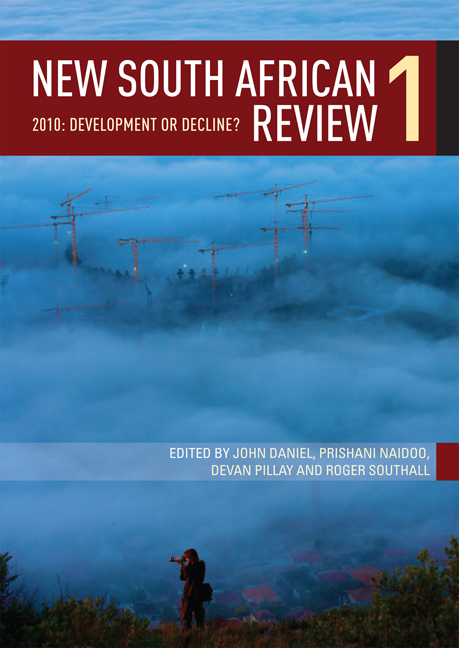Book contents
- Frontmatter
- Contents
- Preface
- Introduction South Africa 2010: From short-term success to long-term decline?
- PART 1 ECONOMY, ECOLOGY AND SUSTAINABILITY
- PART 2 STATE, POLITICS AND POLICY
- PART 3 EDUCATION, HEALTH AND LAND
- PART 4 Doreen Atkinson
- INTRODUCTION Signs of social decline? Crime, prisons, child trafficking and transactional sex
- CHAPTER 17 Our burden of pain: Murder and the major forms of violence in South Africa
- CHAPTER 18 Waiting for Godot: Awaiting trial detainees in South Africa
- CHAPTER 19 Wolves in sheep's skin: Trafficking of children in Musina, Limpopo Province
- CHAPTER 20 Relationships of exchange amongst South African youth in an age of conspicuous consumption
- Contributors
- Index
CHAPTER 18 - Waiting for Godot: Awaiting trial detainees in South Africa
from PART 4 - Doreen Atkinson
Published online by Cambridge University Press: 21 April 2018
- Frontmatter
- Contents
- Preface
- Introduction South Africa 2010: From short-term success to long-term decline?
- PART 1 ECONOMY, ECOLOGY AND SUSTAINABILITY
- PART 2 STATE, POLITICS AND POLICY
- PART 3 EDUCATION, HEALTH AND LAND
- PART 4 Doreen Atkinson
- INTRODUCTION Signs of social decline? Crime, prisons, child trafficking and transactional sex
- CHAPTER 17 Our burden of pain: Murder and the major forms of violence in South Africa
- CHAPTER 18 Waiting for Godot: Awaiting trial detainees in South Africa
- CHAPTER 19 Wolves in sheep's skin: Trafficking of children in Musina, Limpopo Province
- CHAPTER 20 Relationships of exchange amongst South African youth in an age of conspicuous consumption
- Contributors
- Index
Summary
What is that world like? It is one of repression and of baseness where the lowest instincts
prevail; it is a world of humiliation and whore's values … it is a world with its own culture –
language, customs, laws, myths, structures; it is a world of promiscuity, of closeness
in fetid cells, of living in the clothes and beds of others, of greyness,
of losing all sense and appreciation of beauty …
(The True Confessions of an Albino Terrorist, Breyten Breytenbach, 1984)Yet, in many parts of Africa, significant gaps exist between the state's de jure and de facto
compliance with international standards in respect of pre-trial detention.
(Martin Schönteich, 2008)The reality is that many unsentenced prisoners [in South Africa] spend long periods awaiting
trial and many of them will be acquitted
(Lukas Muntingh, 2009a)THE CARCERAL ARCHIPELAGO
It was in 1975 that Michel Foucault (1999: 297) famously suggested that we live in ‘what one might call [a] carceral archipelago’. He was perhaps influenced by the haunting title of Alexander Solzhenitsyn's The Gulag Archipelago, his opus on the Soviet forced labour and concentration camp system (Gulag being the Russian acronym for the whole system) which had been published in the West a year before. During the forty-six-year long apartheid era, countless South Africans were made familiar with a similar sort of carceral archipelago.
It was of course not only political prisoners who knew about the local archipelago. Hundreds of thousands of ‘ordinary’ African men and women, even if they eschewed politics, knew all about the inside of jails because of the pass (dompas) laws.
With the ending of apartheid, that ghastly reality has ended and the local situation is of course different. Or is it? The country has a democratic government and there are no political prisoners or, at least, political detainees. Yet we still have inside our borders a prison archipelago although it is not as secret or murderous as that which existed before 1994. In South Africa there were in 2009 about 166 000 people ‘behind bars’, so to speak (Mashele 2009: xvi).
- Type
- Chapter
- Information
- New South African Review2010: Development or Decline?, pp. 410 - 425Publisher: Wits University PressPrint publication year: 2010



